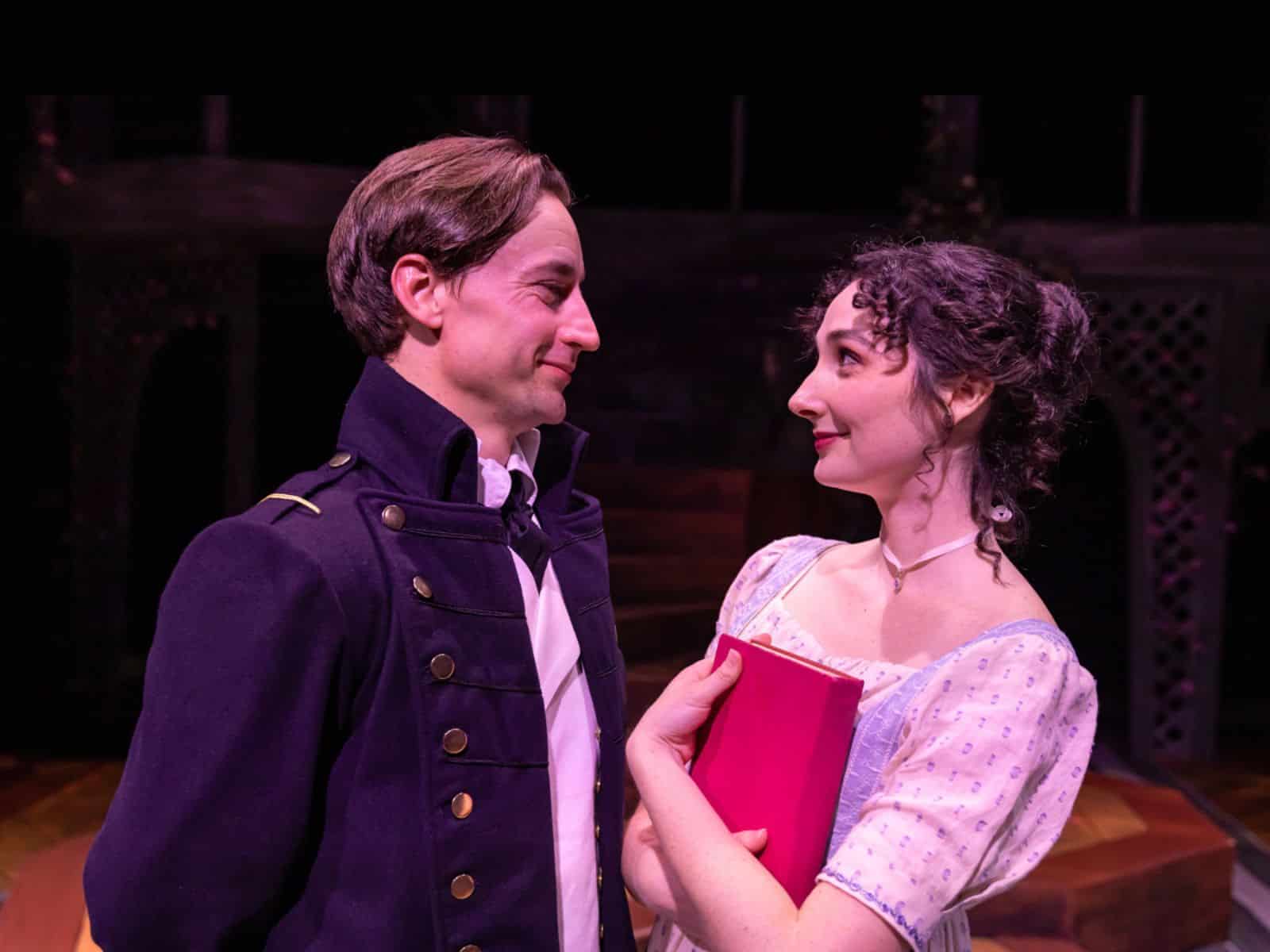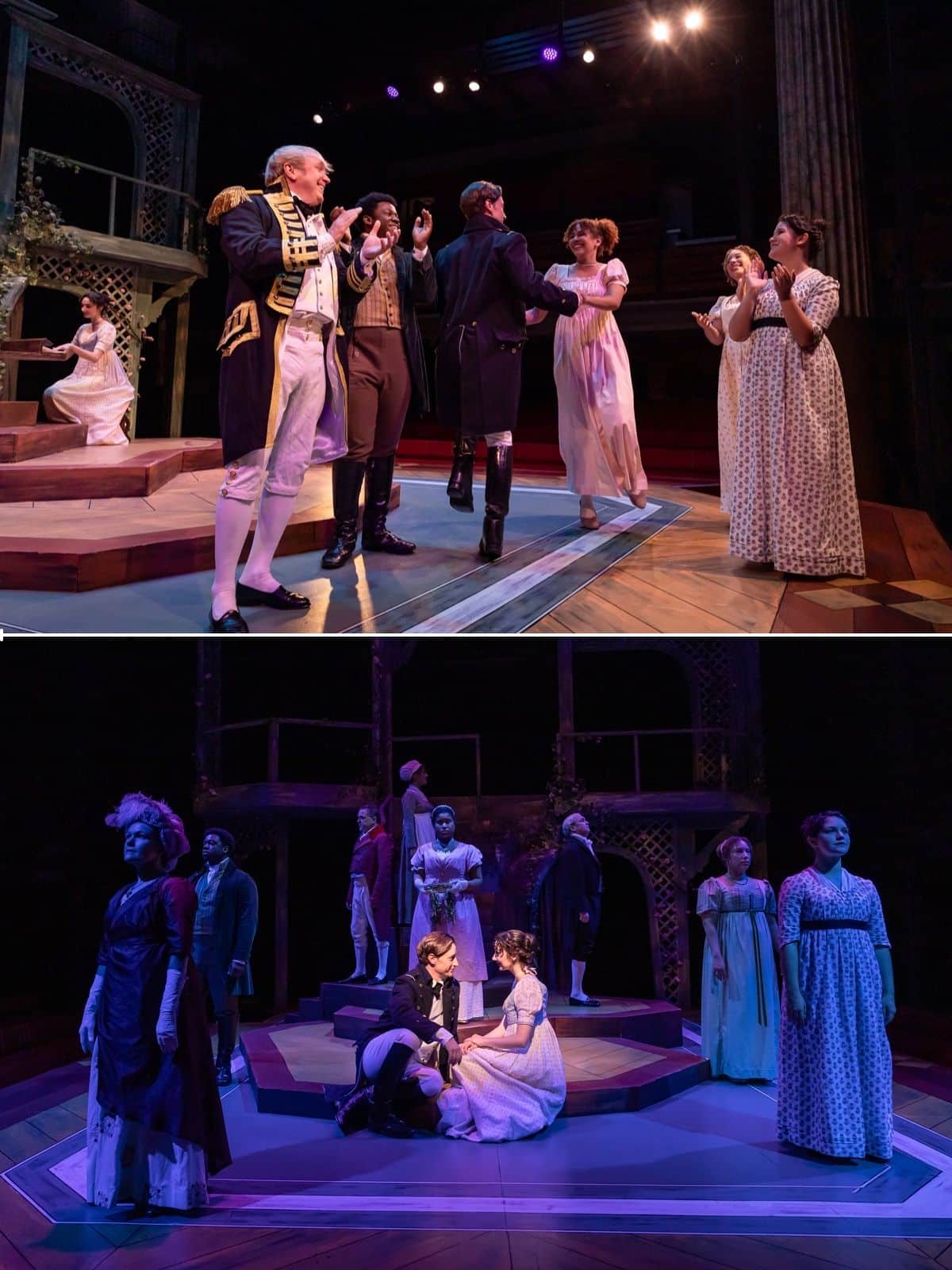Jane Austen’s Persuasion, published posthumously in 1817, is sometimes viewed wistfully as an elegiac novel, the plaintive wish-fulfillment of an old maid, as if Austen were aware of her impending death and looking back with regret on lost romances and the second chances she would never have.
Chesapeake Shakespeare Company’s current production proves brilliantly that this is rubbish. Without in any way short-changing the delicacy of the original novel, this stage production fills it to the brim with humor, music, song, and dance, giving modern audiences all the liveliness and snappy pace they could wish for alongside the beautiful language, graceful manners, and subtle expressions of strong feeling that Jane Austen fans revere.

Sarah Rose Kearns, the adaptor, does a fine job of compressing the story while keeping the most important characters and plot elements. In 1814, the vain spendthrift Sir Walter Elliot is forced to rent out his estate and move to smaller digs in Bath so he can continue his fine lifestyle for less lucre. It turns out that the Admiral he rents it to is related to the man his middle daughter Anne was persuaded to break off her engagement with eight years before, because her snobbish godmother thought it was imprudent and beneath her — although now he is a wealthy naval captain. The former lovers are thrown back together, and it seems clear he has not forgiven what he sees as her wishy-washy abandonment of him. All the other young ladies in the neighborhood immediately “set their caps” at him, while Anne shrinks back, assuming her chance is long past. Will they or won’t they overcome all obstacles and find a second chance at love? That is the plot of the play.
Meghan Behm, the director, seizes the nautical themes of the novel, setting the tone at the start with three actors rousing the audience with a series of sea chanteys. These are followed by some more plaintive songs sung by some of the women, and then a fully choreographed song and dance prelude that beautifully shows the history of the two lovers. (Music direction is by Grace Srinivasan, choreography by Cjay Philip.) From there on, Behm misses no opportunity to adorn the proceedings with dances and songs (including a lovely interlude of Italian opera). But perhaps the greatest gift Behm gives the audience is hearty dollops of humor, perfectly transferring Austen’s wit to the stage. Touches like two silly sisters engaging in a hilarious duet with one growling through the male part, or hiking up their skirts to climb out an invisible window, mesh well with Austen’s verbal zingers and prevent the presentation from becoming reverential. Another way Behm keeps the energy flowing is by having characters frequently interrupt and talk over each other. She also makes good use of Kathryn Kawecki’s lovely flower-touched multilevel set on the Shakespearean thrust stage, at times focusing on a particular character doing something as simple as donning a coat and thinking, while distracting from the other characters changing the furniture on set.
The other technical aspects are equally well done. The costumes (by Kristina Lambdin), always vital in a period piece, are lovely, with special touches such as a jaunty asymmetrical plum-colored pelisse, some fetching bonnets, and well-appointed naval uniforms. Most of the actors embody several roles, and while most of the transitions are obvious — civilians reappearing as officers, or the Admiral’s wife wearing a navy-blue and white ensemble, for instance — and all of them differentiate their characters well by their bearing and accents, for some of the young women it would be easier for the audience to tell their characters apart if there were more changes in their appearance, especially in how they dress their hair. Katie McCreary’s lighting capably distinguishes between present and flashbacks and helps keep everything clear, while Matthew Datcher’s sound keeps everything in balance and allows everyone to be heard.

As for the actors, their biggest challenge, as mentioned above, is differentiating between their characters. For the most part, they do well. Brendan Murray sets the tone at the start as the amusing preening peacock, Sir Walter. Later, he brings more poignancy (and a soft Irish brogue) to the bereaved Captain Harville. Jonas Connors-Grey begins as the rather colorless Mr. Shepherd, but comes into his own as the gruff and hearty Admiral Croft, and hysterically later as … well, you’ll just have to see the show for that one. Molly Moores is almost unbearably snobbish as the engagement-wrecking Lady Russell, but her bewildered soliloquy at the end about her inability to understand these changing times redeems her somewhat. Moores is more down-to-earth in her brief turn as the (also Irish) Mrs. Harville. Elana Michelle plays an interesting trio of characters; she is almost invisible as Sir Walter’s eldest daughter, Elizabeth, but much more lively as the cheerful Mrs. Croft, clearly in love with her husband, but taking no guff about women’s capabilities. But Michelle’s most interesting role is as the melancholy Captain Benwick, whom she portrays with dignity and depth. Isaiah Mason Harvey is equally effective (although greater costume differentiation would add even more) as the very loud Charles Musgrove, alternately fighting and giving in to his whiny wife, and the slimy player Mr. Elliot, attempting to sweep Anne Elliot off her feet. Harvey has tremendous fun with a bit where Mr. Musgrove is “looking out the window” at (his other role) Mr. Elliot, remarking that he looks familiar, and exclaiming what a handsome, fine figure of a man he is! As Mary Musgrove, Charles’s wife and Anne’s other sister, Mady Sims does not double any other role. Perhaps that is because to be such a whiny, melodramatic, self-centered hypochondriac is a full-time job. She is one of Austen’s great comic characters, and Sims does her justice. Sophia Early nicely embodies the stubborn, silly, but delicate Louisa Musgrove as her only credited role, but also beautifully sings the Italian love arias in the concert scene. And Dawn Thomas Reidy, although she doesn’t really get much chance to reveal the scheming side of the man-hungry Mrs. Clay, is tremendously funny as Henrietta Musgrove. Her every action and expression, from mooning over her fiancé to singing baritone to merely falling asleep on Anne in a carriage, evokes laughs. She is another character, though, who could benefit from a more obvious costume change between her characters, especially while the audience is just catching on to the doubling at the beginning of the show.
Of course, every Austen story depends on its lovers, and Persuasion has a good pair. As Frederick Wentworth, Joe Carlson is pleasing in looks and manner, and conveys a fairly wide range of emotion, from awkward affection at the beginning, through spurned anger, to obligatory flirting with the girls, back to agonized, hopeful potential lover. His best moments may actually be his brotherly interplay with his sister Mrs. Croft; their sibling affection and humor are obvious. He seems, however, to take his affronted anger just a bit further than a gentleman’s restraint would allow — or perhaps it is because he seems to pitch almost all his lines at a greater volume than the other characters’, as if he were yelling into the teeth of a gale.
It is Marissa Chaffee’s Anne Elliot, though, who is the crowning jewel of the show, as is only right. Chaffee spends most of the first act simply reacting to what other characters are doing and saying — one of the hardest tasks an actor can take on — and does it brilliantly. Her delicate, expressive face covers every possible emotion in a moment — chagrin, surprise, embarrassment, humor, amorous interest, longing, regret. And when she does begin standing up for herself, she perfectly captures Anne’s strength of character, capability in the face of idiocy all around her, modesty, and lasting devotion. Anne Elliot, in the wrong hands, could come across as washed-up and passive, but Chaffee infuses her with sparkle and amusement as well as constancy and strength. Her manner and bearing are quintessential Austen. She is a delight.
Chesapeake Shakespeare Company’s Persuasion presents a fitting tribute for Jane Austen’s 250th Birthday Celebration — beautiful, humorous, lively, delicious, and romantic. It is everything Austen could wish. And she would graciously invite you to enjoy it.
Running Time: Two hours and 30 minutes, including one 15-minute intermission.
Persuasion plays through October 26, 2025 (Thursdays at 7:30 pm, Fridays and Saturdays at 8 pm, Saturday and Sunday matinees at 2 pm), at Chesapeake Shakespeare Company, 7 South Calvert Street, Baltimore, MD. Adult tickets start at $69, tickets for youth 25 and under start at $31. Purchase tickets by calling 410-244-8570, emailing boxoffice@chesapeakeshakespeare.com, visiting the Box Office in person, or ordering online. For directions, parking, transportation, and other plan-your-visit information, click here.
The program for Persuasion is online here.
Jane Austen’s Persuasion
A new adaptation by Sarah Rose Kearns
Directed by Megan Behm



